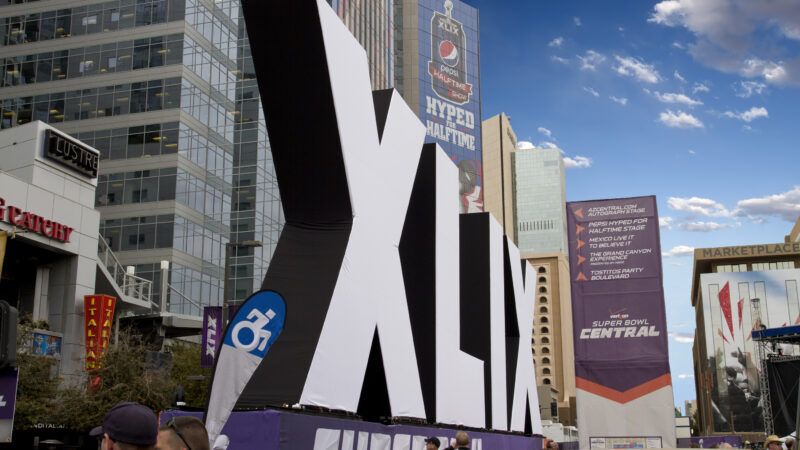Phoenix and the NFL Are Censoring Small Business Owners' Signs
Property owners are required to get permission from the city, the NFL, and/or the private Arizona Super Bowl Host Committee before displaying temporary advertisements and signs.

Property owners in Phoenix are objecting to a new downtown "Clean Zone" that requires them to get permission from city hall, the National Football League (NFL), and/or a private Super Bowl host committee in order to display temporary signage and advertisements in the run-up to the game.
They say the new restrictions are costing them business and likely classify as unconstitutional restrictions on their speech.
Downtown Phoenix is set to host a number of Super Bowl events in the run-up to the game, which will be played in neighboring Glendale, Arizona. Catching the eyeballs of thousands of Super Bowl attendees and revelers should make advertising downtown a lucrative proposition.
But in October, the city passed a resolution creating its "Clean Zone" in downtown. Within that area, property owners are required to get a city permit for temporary signage as well as the approval of the NFL and/or the Arizona Super Bowl Host Committee.
"It's a blanket prior restraint on speech," says John Thorpe, an attorney with the free market Goldwater Institute. "There are no guidelines, no criteria they give for what the NFL or the [Arizona Super Bowl Host] Committee are allowed to base their decisions on."
On Tuesday, Thorpe sent a letter to Phoenix City Attorney Julie Kreigh on behalf of business owner Bramley Paulin, who wanted to lease advertising space on one of his downtown properties located in the "Clean Zone."
Paulin claims that the new restrictions have scared away all potential business partners who would otherwise be interested in leasing signage space from him.
Thorpe's letter argues that in addition to being economically cost to Paulin, the city's signage regulations violate "state and federal constitutional provisions protecting freedom of speech, as it is overbroad, a prior restraint, and a content-based regulation."
City officials have cited a number of justifications for these restrictions.
The intent is "to protect local businesses from 'ambush' or 'guerrilla' marketing attempts during the event period," according to a fact sheet on the Clean Zone.
At a Super Bowl small business workshop in November, a city staffer also said that the purpose was to protect consumers from "unlicensed merchandise" and official Super Bowl sponsors from unauthorized competition.
"The NFL sponsors are making a huge financial commitment to be one of those designated sponsors, and we need to provide that protection to those sponsors in the downtown area where a lot of the Super Bowl events are happening," said the staffer.
"This is about protectionism," says Thorpe. Given the city's statements about protecting official NFL sponsors, Thorpe argues that the signage restrictions effectively amount to unconstitutional content-based restrictions on speech. Additionally, the lack of formal criteria for how exactly signs will be evaluated makes the restrictions unconstitutionally vague.
Thorpe's letter to the city asks that they clarify that Paulin and any potential business partners can advertise on his property without any input or review from the NFL or the Arizona Super Bowl Host Committee.
The Phoenix city government says it will be enforcing its signage restrictions from mid-January through mid-February. The deadline for turning in applications for temporary signs was yesterday.
